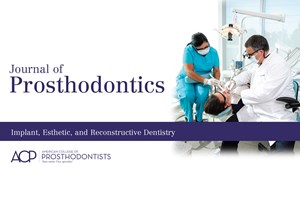Source: American College of Prosthodontists
American College of Prosthodontists' Clinical Practice Guidelines on Caring for Patients with Dental Restorations Accepted into National Guideline Clearinghouse
CHICAGO, Dec. 9, 2016 (GLOBE NEWSWIRE) -- Clinical practice guidelines (CPGs) from the American College of Prosthodontists (ACP) that recommend lifelong oral health care for patients with dental restorations have been accepted into the National Guideline Clearinghouse, an online repository of practice guidelines intended to improve health care outcomes by making evidence based information more accessible and standardized.
Inclusion of these dental practice guidelines on the Agency for Healthcare Research and Quality's medicine-focused National Guideline Clearinghouse makes them among only 32 dentistry-specific CPGs—and the first with a prosthodontic emphasis—published to date in this large, searchable federal database, said Avinash Bidra, DDS, MS, FACP, the lead author of the guidelines and a prosthodontist at the University of Connecticut Health Center in Farmington, Conn.
"Because this popular federal website is free, it attracts both health care providers and the public, and we expect a broader dissemination of the ACP's message that teeth with restorations require as much or more care and maintenance than unrestored teeth," Dr. Bidra said. "In addition, oral health care providers now have easy access to refer to the practice guidelines and their recommendations for lifetime maintenance of dental restorations and how often these patients should have dental checkups."
Dental restorations, also called dental prostheses, are customized tooth replacements such as crowns, bridges and veneers or those supported by dental implants. Several million Americans have crown and bridge replacements for missing teeth, and millions more have dental implants.
The prosthodontic CPGs were developed from comprehensive systematic reviews of the most current scientific literature pertaining to dental restorations. To establish consensus, the ACP led a panel of scientific experts appointed by the College, the American Dental Association, the Academy of General Dentistry and the American Dental Hygienists Association. The multidisciplinary panel evaluated and debated findings from two systematic reviews covering relevant articles published over the past 10 years.
Panel members' evidence-based recommendations include a program of lifelong regular professional dental maintenance; patient education about ongoing at-home maintenance, including oral hygiene; and frequency of patient recall for dental examination. Separate recommendations appear for tooth-supported and implant-supported restorations.
"Following these care guidelines can help patients keep their restored teeth healthy and strong, thus lowering their risk for costly do-over dentistry," ACP President Susan E. Brackett, DMD, FACP, said.
Yet, the scientific evidence for the best way to care for and maintain restored teeth had not been comprehensively studied and evaluated until publication of the review articles and guidelines for dental restorations, in a special supplement to the January 2016 issue of the Journal of Prosthodontics.
The guidelines for dental restoration intend to standardize the continuing care of this large dental patient population to what evidence shows is most appropriate for the patient, said Donald A. Curtis, DMD, FACP, a coauthor of both systematic reviews and the guidelines and a prosthodontist at the University of California San Francisco School of Dentistry.
"The National Guideline Clearinghouse provides an important source of information for evidence-based medicine. Having an ACP-led initiative that was accepted to the clearinghouse is a significant step in moving toward evidence-based dentistry," Dr. Curtis said.
A summary of "Clinical Practice Guidelines for Recall and Maintenance of Patients with Tooth-borne and Implant-borne Dental Restorations" will post on the clearinghouse's website at https://www.guideline.gov, anticipated by early next year.
An unrestricted educational grant from the Colgate-Palmolive Company partially funded the CPG development project.
For more information about maintaining restored teeth, see the ACP videos "How Long Do Crowns, Veneers, Bridges Last?" (available at https://www.youtube.com/watch?v=UrYbtJ0C-iU&feature=youtu.be) and "8 Tips to Avoid Do-Over Dentistry" (https://www.youtube.com/watch?v=1FzPj2KGybg&feature=youtu.be).
Prosthodontists are specialized dentists with advanced training in oral health issues, who are committed to improving patient outcomes. From implants, crowns, veneers and tooth whitening, to full-mouth reconstruction, prosthodontists are regarded as the go-to specialists for comprehensive dental needs.
The ACP is the only prosthodontic specialty organization whose membership is based solely on education credentials. ACP members must be in or have completed an ADA-accredited advanced education program in Prosthodontics.
####
About the ACP
The American College of Prosthodontists (ACP) is the official sponsoring organization for the specialty of Prosthodontics, which is one of only nine recognized specialties of the American Dental Association. Founded in 1970, ACP is a not-for-profit organization dedicated to enhancing patient care, advancing the art and science of Prosthodontics, promoting the specialty of Prosthodontics to the public and other dentists and healthcare professionals, ensuring the quality of prosthodontic education and providing professional services to its membership. For more information visit GoToAPro.org.
Article Link:
Journal of Prosthodontics
http://onlinelibrary.wiley.com/doi/10.1111/jopr.2015.25.issue-S1/issuetoc
ACP Videos:
• How Long Do Crowns, Veneers, Bridges Last?
(https://www.youtube.com/watch?v=UrYbtJ0C-iU&feature=youtu.be)
• 8 Tips to Avoid Do-Over Dentistry
(https://www.youtube.com/watch?v=1FzPj2KGybg&feature=youtu.be)
A photo accompanying this release is available at:
http://www.globenewswire.com/newsroom/prs/?pkgid=41979
